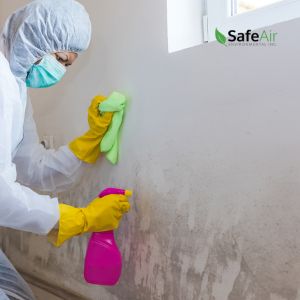Is a Landlord Responsible for Mold in Ontario
Posted in Mold, on April 10, 2024
A primary duty of a landlord is to keep their property in a good state of repair, which in Ontario means preventing and removing mold growth. At SafeAir, we’ve helped thousands of property managers and landlords root out toxic mold through mold inspections in Toronto. Mold spores can be detected during air quality testing even when the infestation is invisible or hidden behind walls or flooring. If you’re a landlord in Ontario, here’s what we think you need to know about mold.
An Overview of a Landlord’s Responsibility for Mold
 The Ontario Residential Tenancies Acts and its regulations outline the obligations and rules for rental units across the province, and is designed to eliminate grey areas that result in disagreement or conflict. Both landlords and tenants have rights and responsibilities under the act, and when it comes to mold, landlords are on the hook for preventing mold growth, especially when neglecting maintenance or fixable problems lead to its growth.
The Ontario Residential Tenancies Acts and its regulations outline the obligations and rules for rental units across the province, and is designed to eliminate grey areas that result in disagreement or conflict. Both landlords and tenants have rights and responsibilities under the act, and when it comes to mold, landlords are on the hook for preventing mold growth, especially when neglecting maintenance or fixable problems lead to its growth.
Mold causes several negative health effects and can ruin tenant property and make people very ill. If your rental property has a mold issue that makes people sick or damages your unit, your obligation and legal responsibility is to address it promptly.
Causes of Mold In Rental Properties
Houses, condominiums, duplexes, and townhomes can all experience mold growth related to the building’s site/location, its architecture or features, and through accidents or use. Some of the causes the SafeAir team commonly finds include:
- Roof leaks or damage.
- Plumbing leaks or accidents.
- Condensation or humidity.
- Poor ventilation.
- Tenant activities (bathing, cooking, etc.)
Landlord’s Responsibility for Mold Remediation
If your tenants alert you to a known cause or the existence of mold growth, SafeAir suggests you book a mold inspection as soon as possible. You are responsible for providing a safe and healthy living environment, which mold immediately compromises. When mold growth is the effect of a problem the landlord has known about or neglected, it is the landlord’s responsibility to pay for the safe remediation.
Tenant’s Responsibilities Regarding Mold
Tenants also play a critical role in preventing mold growth. As a tenant, you must report any issues to the landlord and keep the property clean and sanitary. You must also allow the landlord to inspect or perform assessments like mold inspection or air quality testing. Tenants may be liable for mold damages and remediation if they have misreported or failed to report a problem that leads to mold.
How to Handle Mold Issues in Rental Properties
Over the last decade, the SafeAir team has helped thousands of landlords and tenants ensure their rental properties are clean and safe. Everyone plays a role in keeping the property mold-free: tenants must report problems that can cause or lead to mold growth, and landlords must address mold concerns promptly and effectively.
SafeAir can help you manage your property through mold inspection in Toronto. Whether you’re in between tenants, have long-term renters, or are putting a new property on the market, our team can help you assess your risk of mold and make positive changes to prevent it and limit your liability. Contact the SafeAir team to learn more and to book mold or air quality testing today.

